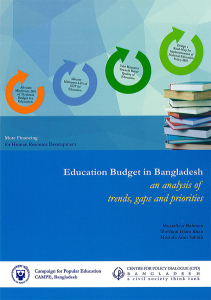 Bangladesh has made impressive progress in terms of addressing inequities in schooling enrolment and as regards some of the learning outcomes. This is particularly reflected in Bangladesh’s Millennium Development Goal (MDG) outcomes. However, this progress needs to be consolidated and further strengthened in view of a number of unfinished agendas and emerging challenges. Success attained in horizontal access to educational opportunities itself has brought to the fore increasing concerns regarding quality of education, learning outcomes, equity, and relevance of the learning content, from the point of view of skills and capacity building of learners. Indeed, ensuring equal access to quality education at all levels for all is a commitment which has been reaffirmed in both the Seventh Five Year Plan (7FYP) and the 2030 Agenda for Sustainable Development. From the vantage point of addressing these challenges, the national budget is a powerful tool and it is reckoned that if properly deployed, the budget could play a critically important role in achieving the relevant results and targets concerning education in Bangladesh.
Bangladesh has made impressive progress in terms of addressing inequities in schooling enrolment and as regards some of the learning outcomes. This is particularly reflected in Bangladesh’s Millennium Development Goal (MDG) outcomes. However, this progress needs to be consolidated and further strengthened in view of a number of unfinished agendas and emerging challenges. Success attained in horizontal access to educational opportunities itself has brought to the fore increasing concerns regarding quality of education, learning outcomes, equity, and relevance of the learning content, from the point of view of skills and capacity building of learners. Indeed, ensuring equal access to quality education at all levels for all is a commitment which has been reaffirmed in both the Seventh Five Year Plan (7FYP) and the 2030 Agenda for Sustainable Development. From the vantage point of addressing these challenges, the national budget is a powerful tool and it is reckoned that if properly deployed, the budget could play a critically important role in achieving the relevant results and targets concerning education in Bangladesh.
The present study has made an attempt to analyse the current trends in education finance in Bangladesh, and examine and assess whether the level of finance is adequate to fulfill the national commitments to ensure quality education for all. With a view to assess the trends in national budget for education in Bangladesh, the study has followed a derived analytical framework. The budgetary allocation for education in Bangladesh has been examined from a number of angles: in terms of adequacy of resources from the perspective of allocation of finance and sources of financing; distribution of resources focusing on quality and equity in distribution; utilisation of resources from the point of view of efficiency and governance of resources allocated for education. In this connection, the study has made use of both primary and secondary data and information. Relevant national and international literature, including contributions of both CPD and CAMPE on relevant issues, have complemented the analysis undertaken for the study. As may be recalled, CAMPE had earlier organised public hearings on education budget, in partnership with Channel i, in six divisions of the country which were participated by about thirty three thousand people. Proceedings of these meetings and their recommendations have also informed this study.
Authors: Mustafizur Rahman, Towfiqul Islam Khan and Mostafa Amir Sabbih
Editors: Manzoor Ahmed, Rasheda K. Choudhury and Mostafizur Rahaman .
Publishers: Campaign for Popular Education (CAMPE) and Centre for Policy Dialogue.
Publication period: June 2016.
ISBN: 978-984-34-0850-1

